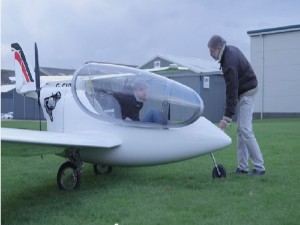
An aircraft with a parallel hybrid engine – the first ever to be able to recharge its batteries in flight – has been successfully tested in the UK, an important early step towards cleaner, low-carbon air travel.
Credit: University of Cambridge
The United Kingdom is taking an important step towards cleaner, low-carbon air travel with the first successfully tested airplane with a parallel hybrid-electric engine. The novel aircraft is the first of its kind due to the ability to recharge its batteries while in flight.
This development comes out of the University of Cambridge in conjunction with Boeing, where they have worked to successfully develop a parallel hybrid-electric propulsion system for an aircraft that will use up to 30 percent less fuel than a comparable plane with a petrol-only engine.
To create the plane, the researches used the same basic principals as in a hybrid car. The aircraft uses a 4-stroke piston engine and an electric motor/generator. When maximum power is required – i.e. during takeoff – the engine and electric motor work together to power the plane. Once cruise height is reached, the motor switches to generator mode to recharge its batteries.
This from the University of Cambridge:
The hybrid power system in the Cambridge demonstrator is based on a Honda engine, in parallel with a custom lightweight motor. A power electronics module designed and built in the Engineering Department controls the electrical current to and from the batteries – a set of 16 large lithium-polymer cells located in special compartments built into the wings. The petrol engine is optimally sized to provide the cruise power at its most efficient operating point, resulting in an improved fuel efficiency overall.
“Although hybrid cars have been available for more than a decade, what’s been holding back the development of hybrid or fully-electric aircraft until now is battery technology,” said Dr Paul Robertson of Cambridge’s Department of Engineering, who led the project.
Here at ECS, we’re working on creating a greener future though innovation in sustainable transportation. Our latest opportunity for young scientists, the ECS Toyota Young Investigator Fellowship, aims to promote innovative electrochemical research in green energy technology. Find out more here.

